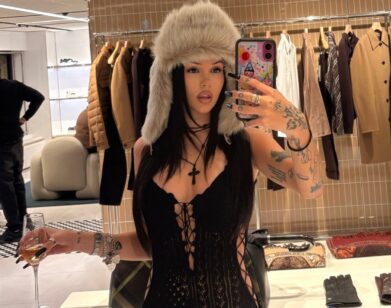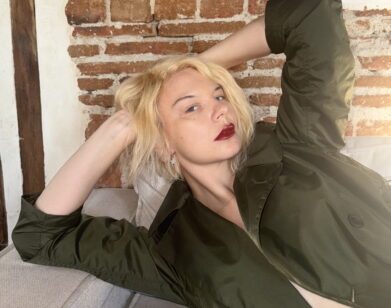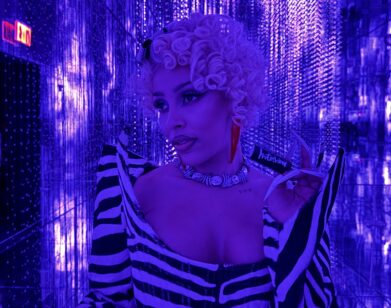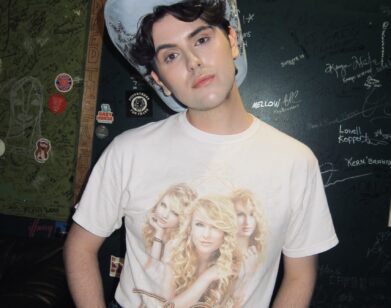Exclusive Song Premiere and Interview: ‘Puppet Master,’ Rickie Jacobs
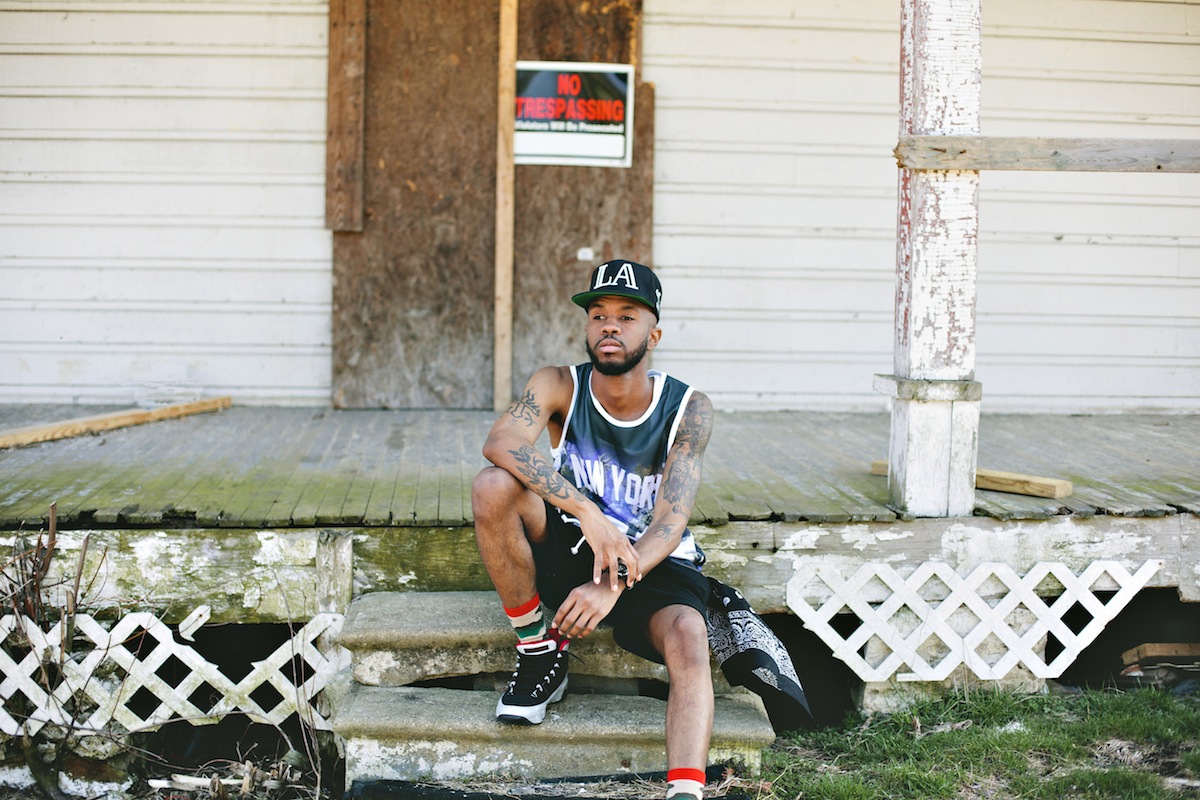
ABOVE: RICKIE JACOBS
Having released five EPs (and two mixtapes) since 2010, Baltimore rapper Rickie Jacobs is unquestionably a prolific force. Last year, the hip-hop world started to take notice: He released The Prequel, a project that helped him receive wider recognition, and performed at SXSW, an experience that he notes was “very disorganized,” but nonetheless essential in drumming up buzz.
Jacobs’ inflections sound familiar, if you’ve ever listened to, say, Big Sean or XV, but his lyrics ooze with abstractions and sentiments brought about by struggle—perhaps because he hasn’t been subject to the dotted line yet. He is a quintessentially American rapper—so much so that his new EP, set to be released June 15, is called Beautiful America. (We’re pleased to debut a track from the EP, “Puppet Master,” below.) By the time you read this, he’ll have been in a Reebok commercial and performed at NYC’s Chelsea Manor. We contacted the MC over Skype to talk about existentialism, being an underdog, and why he hates rap.

SAFRA DUCREAY: I’ve read that Baltimore is becoming a part of a new wave of hip-hop; does this statement ring true for you?
RICKIE JACOBS: I would say there’s a few artists who are definitely on the brink of getting that exposure—we’ve never really got that. There’s not really a market here, you know, like in L.A., New York, or even in Atlanta. I believe with King Los signing to Bad Boy—him getting that co-sign from P.Diddy—is actually opening the doors for artists from our way. It’s not quite there yet, but it’s starting to open up.
DUCREAY: I notice you didn’t bring up Wale. Do you think he plays a pivotal role?
JACOBS: Oh absolutely. Just because where Wale is from [Washington, D.C.]; it’s only 45 minutes from Baltimore, but it’s a different culture. It’s kinda funny how different Washington is from Baltimore, and we’re not that far from each other, but I definitely think that bridged the gap for D.C. and Maryland artists, period.
DUCREAY: You said you identify yourself as an underground artist. But with the Internet and the state of hip-hop right now, do you think it’s even relevant to call yourself that?
JACOBS: To me, ever since social media took over, it really eliminated the term “underground hip-hop,” so to speak. If you’re a traditional underground artist now, you’re just doing things in your respected area, that’s it. But as soon as you put out a record online, and the buzz starts growing, I think that’s when the underground stigma just ends.
DUCREAY: I’m going to cite a verse that you wrote: Even though I always get snubbed / I feel like I’m the greatest, the most underrated nigga in the city. You’re obviously tenacious and consistent; why do you feel as though you’ve always been snubbed?
JACOBS: That line right there is very important to me. I definitely have a chip on my shoulder, and that’s where the consistency comes from. There are artists more famous than me inside the city, but it’s based on the relationships they have with people. When somebody feels threatened by a certain thing or person, what they do is, they form an organization. It might not be a direct operation against you, but they definitely want to keep what’s going on at a certain distance. You know, I have dealt with a lot of people in the city, in the state of Maryland, and things just didn’t work out. But at this point, the proof is in the pudding. There’s really no way you can shade me or anything like that. That line is just me feeling like, even though I’m doing all these things and it’s good for my morale, I feel like I’m still an outcast.
DUCREAY: Virgo Season—did this EP come out?
JACOBS: It did.
DUCREAY: Don’t misinterpret this, but I think of Nas. He’s also a Virgo, he’s middle mainstream, heavily criticized for not being able to live up to Illmatic early on, but still managed to have a fruitful career.
JACOBS: My take on it is, when you ask me a question that only requires a yes or no, I can’t give you that, it’s deeper than that. Nothing makes sense. And I feel like, the way Virgos think, it’s very deep, not in the sense where it makes sense to you, but it makes sense to us. When we finally do speak our mind, a lot of our thoughts will stay inside for a very long time, but when they come out, it’s not pretty, they will cut you. That’s where the misunderstanding comes from. It might just be me. I don’t know too much about zodiac signs, but that’s one thing…
DUCREAY: You know about yourself.
JACOBS: Exactly. Two minutes after, I’ll be like, “Damn, why did I do that?” I think one thing about myself is I just let the world bring whatever comes. It’s gonna shape my life the way it is, I’m not really spiritual, but I believe in energy—I’d say I’m more into energy and earthiness than religious. Life is the most interesting thing, especially when you ask questions like, “Why am I here?”
DUCREAY: Right.
JACOBS: Just like when you call a cat a cat, and a dog a dog. If a cat was called a dog and vice versa, either way that would still make sense to you. Everything makes sense, and everything doesn’t. So that’s why I stay away from the norm and I just do what I want. People don’t understand that because they don’t understand how I think. If I’m gonna fail, then I’m gonna fail. But if it hasn’t failed me yet, then…
DUCREAY: You know, with your mixtape Songs for High School Kids, when you hear it, it’s not really quirky, but if a listener is looking for a type of aesthetic, like Big Sean or Kanye West, they can find that on there. Whether that was intentional or not is up to interpretation…
JACOBS: To rebound on that, I’ll say, especially with critics, this is why I hate rap.
DUCREAY: This is why you hate rap?
JACOBS: I hate rap. But that’s the thing, I rap because I love it, there was a point in time where I really loved it, but there also comes a time when it’s not fun anymore. What makes it not fun is when people don’t approach it with an open mind. Just because it’s rap music, it sounds like this, or if it doesn’t sound like that, they’re just gonna have a one-dimensional way of thinking about it. And my whole thing is Songs For High School Kids is not gonna be a movie that’s focused on one topic. A movie has plots and the scenes that lead to up to the climax. I took a cinematic approach, but not every track is gonna be like that, I think the title speaks for itself…
DUCREAY: It’s a reality.
JACOBS: Right. It has positive notations, then you have your pros and cons—it’s just life. It’s based on being born, you’ve gotta have sex, I mean, that’s inevitable. I may come across as a pervert, I guess, because I may talk about it way more, but I mean, it’s just whatever your vice is. I’ll lure you into the ignorance, but once I have your attention, that’s when I go into the jewels and the gems. I have nephews and I have a kid myself. From my side, I’ve seen the ignorance and I’ve seen the positivity. But I am who I am—I’m not no murderer; I can’t really blame anything on hip-hop, I can’t do that, it starts at home. If they don’t have a foundation at home, they’re gonna lean towards the negativity.
DUCREAY: Chuck D said rap music since the beginning was called the black CNN. Have you heard of Mickey Rourke? He starred in a movie called The Wrestler.
JACOBS: That sounds familiar.
DUCREAY: He was an incredible actor in the ’80s. They were shaping him up be the next, like Robert De Niro, and then he started to hate acting for the same exact reasons you mentioned. So he went into boxing and fucked his face up. He tried to get back into acting because if he stayed…
JACOBS: He would have died.
DUCREAY: Yes. But he had a reputation as being extremely difficult to work with. He was doing B-movies because he couldn’t get anything else. He said he had gotten so low he was almost suicidal. Then Darren Aronofsky gave him a chance, they did The Wrestler, which revived his career. But my point is, he could make such a bold statement and could go do something else. You can say you hate rap, but what else are you going to do?
JACOBS: The sad thing is—I have no Plan B.
BEAUTIFUL AMERICA IS DUE OUT JUNE 15. FOR MORE ON RICKIE JACOBS, VISIT THE ARTIST’S WEBSITE.

